Find the Best Cosmetic Hospitals — Choose with Confidence
Discover top cosmetic hospitals in one place and take the next step toward the look you’ve been dreaming of.
“Your confidence is your power — invest in yourself, and let your best self shine.”
Compare • Shortlist • Decide smarter — works great on mobile too.
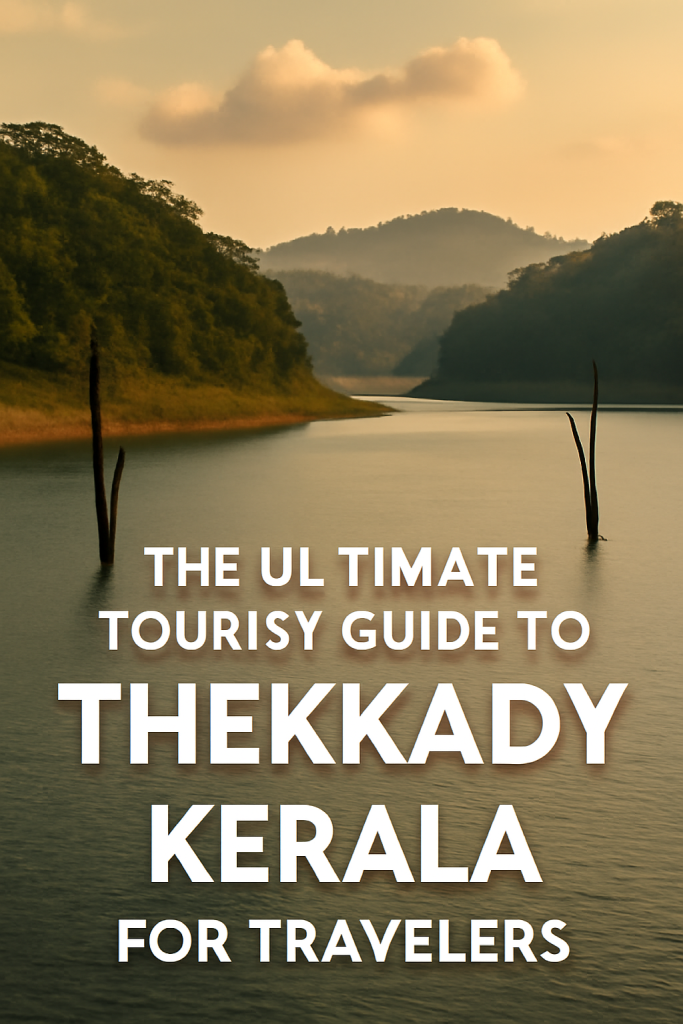
Introduction to Thekkady
Brief Overview and History
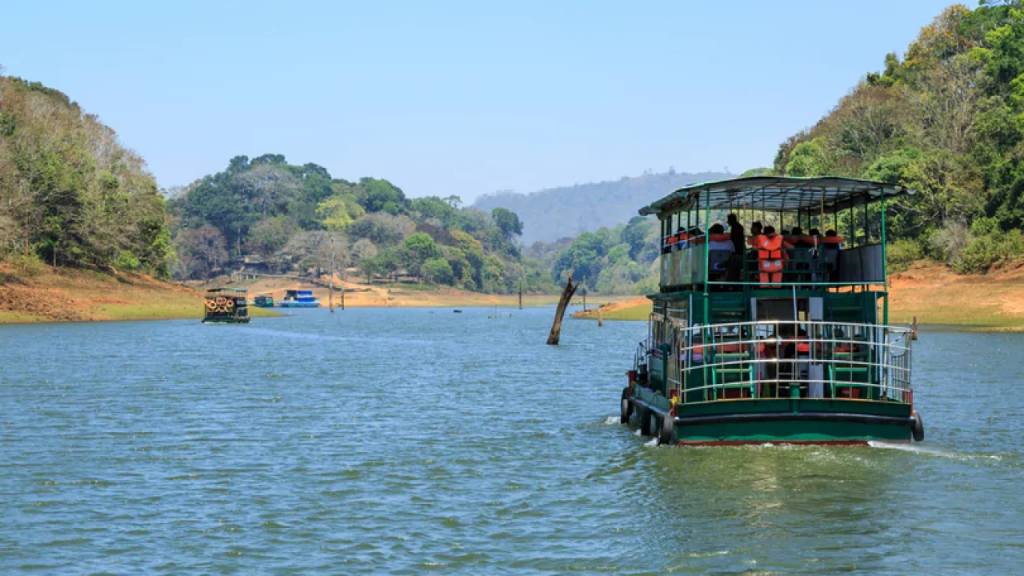
Nestled in the verdant hills of the Western Ghats in Kerala, Thekkady is a charming hill station renowned primarily for its rich biodiversity and spice plantations. The name “Thekkady” literally means “south of the forest” in Malayalam, a fitting description for this gateway to the Periyar Wildlife Sanctuary, one of India’s most famous wildlife reserves.
Historically, Thekkady and its surrounding regions have been home to tribal communities and have thrived on spice cultivation for centuries. The area’s fertile soil and ideal climate have made it a hub for growing some of the world’s most prized spices such as cardamom, pepper, cinnamon, and cloves. Thekkady has gradually evolved from a quiet agrarian region to a bustling tourist destination, attracting nature lovers, wildlife enthusiasts, and adventure seekers alike.
Location and Significance
Thekkady is situated in the Idukki district of Kerala, close to the Tamil Nadu border. It lies approximately 140 kilometers from Kochi (Cochin), Kerala’s commercial capital, and about 114 kilometers from Madurai in Tamil Nadu. Perched at an altitude of around 900 meters above sea level, Thekkady enjoys a pleasant climate throughout the year, making it an ideal escape from the tropical heat of the plains.
Thekkady’s most significant claim to fame is the Periyar Wildlife Sanctuary, which spans over 350 square kilometers of dense forests, hills, and grasslands. This sanctuary is a crucial habitat for elephants, tigers, gaur (Indian bison), and a plethora of bird species. The area also holds immense ecological importance as part of the Western Ghats, a UNESCO World Heritage Site known for its unique flora and fauna.
Why Visit Thekkady? (Unique Selling Points)
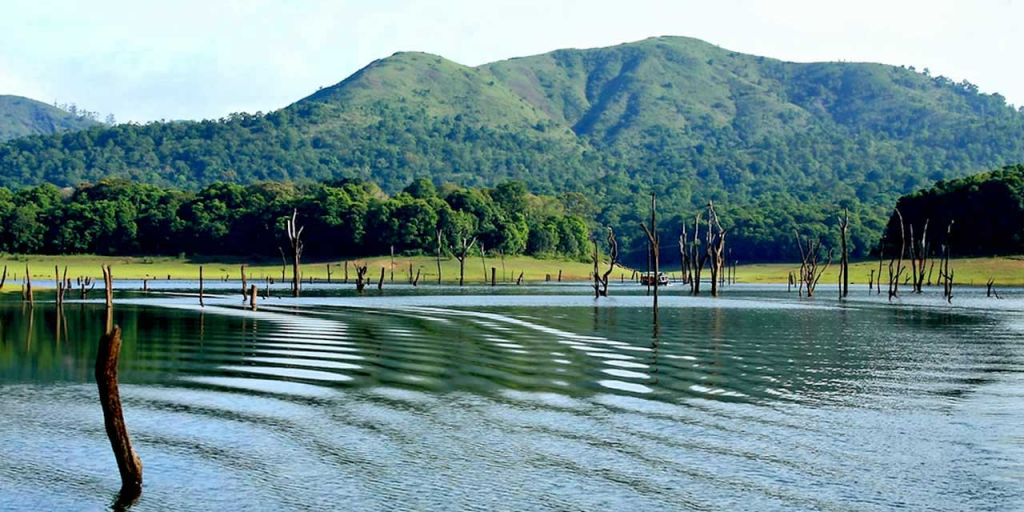
- Rich Wildlife Experience: Thekkady offers some of the best opportunities in India to witness wild elephants, tigers, leopards, and other exotic species in their natural habitat through guided safaris and boat cruises on Periyar Lake.
- Lush Spice Plantations: Tourists can explore sprawling spice gardens where cardamom, pepper, vanilla, and other aromatic spices are cultivated, gaining insight into traditional farming methods and the spice trade.
- Adventure and Nature Activities: From trekking through misty trails and bamboo rafting on serene rivers to bird watching and nature walks, Thekkady caters to all adventure and nature enthusiasts.
- Cultural Encounters: Visitors can experience Kerala’s rich cultural heritage through traditional art forms like Kathakali dance performances, martial arts (Kalaripayattu) shows, and local festivals.
- Eco-Tourism and Sustainability: Thekkady promotes responsible tourism with a focus on preserving its delicate ecosystem, making it a perfect destination for eco-conscious travelers.
How to Reach Thekkady
Nearest Airports and Distance
Thekkady is well connected by air through nearby airports, making it accessible from major cities in India and abroad.
- Cochin International Airport (COK): Located about 140 kilometers from Thekkady, this is the closest major airport. It operates domestic and international flights, connecting Kerala to cities like Delhi, Mumbai, Chennai, and Gulf countries. From the airport, travelers can hire taxis or take buses to reach Thekkady.
- Madurai Airport (IXM): Approximately 114 kilometers from Thekkady, Madurai Airport in Tamil Nadu serves as an alternative entry point, especially for visitors coming from the southern and eastern parts of India. Domestic flights connect Madurai to major Indian cities.
- Trivandrum International Airport (TRV): Though farther away at around 190 kilometers, Trivandrum can be an option for travelers planning to explore southern Kerala before heading to Thekkady.
Railway Connectivity
Thekkady does not have a railway station of its own, but several nearby stations connect it to the Indian Railways network:
- Kottayam Railway Station: About 110 kilometers from Thekkady, Kottayam is the most commonly used railhead for travelers coming from Kochi or the northern parts of Kerala.
- Changanassery Railway Station: Roughly 107 kilometers away, Changanassery is another convenient station to access Thekkady.
- Madurai Railway Station: Located around 114 kilometers away, Madurai station is a good option for visitors coming from Tamil Nadu or the eastern states.
From these stations, travelers can take taxis or buses to reach Thekkady.
Road Routes and Bus Services
Thekkady is well connected by road to major towns and cities in Kerala and Tamil Nadu:
- From Kochi: The route via Muvattupuzha, Kothamangalam, and Munnar is scenic and takes approximately 4 to 5 hours by car or bus.
- From Madurai: A drive of about 3 to 4 hours through scenic hill roads leads to Thekkady.
- Bus Services: Kerala State Road Transport Corporation (KSRTC) and private operators run regular bus services to Thekkady from Kochi, Kottayam, Madurai, and other nearby towns. Both ordinary and luxury Volvo buses are available.
- Taxis and Rental Cars: For more comfort and flexibility, tourists can hire taxis or rent self-drive cars from major nearby cities.
Tips for Travelers
- Best Mode of Transport: For international and long-distance travelers, flying into Cochin International Airport and then taking a taxi or bus to Thekkady is the easiest and fastest option.
- Travel Time: Depending on your starting point, the journey to Thekkady can take between 3 to 5 hours by road. If coming by train, factor in additional travel time for the road segment from the railway stations.
- Road Conditions: The roads to Thekkady are generally well maintained, but the hilly terrain means winding roads and occasional narrow stretches. Drive carefully, especially during monsoon season.
- Advance Booking: It’s advisable to book taxis or buses in advance during peak tourist seasons (December to March and July to August) to avoid last-minute hassles.
- Local Transport: Within Thekkady, auto-rickshaws and taxis are easily available for short distances, including trips to the wildlife sanctuary and spice plantations.
Best Time to Visit Thekkady
| Aspect | Details |
|---|---|
| Weather and Climate | |
| Summer (Mar – May) | Warm (20°C–30°C), moderate humidity, bearable heat compared to plains |
| Monsoon (Jun – Sep) | Heavy rainfall, cooler temperatures (19°C–25°C), lush greenery, possible travel disruptions |
| Winter (Oct – Feb) | Cool and pleasant (15°C–25°C), dry weather, ideal for outdoor activities and wildlife spotting |
| Peak Tourist Seasons | |
| Winter (Oct – Feb) | Best weather, high tourist influx, popular for safaris, trekking, and sightseeing |
| Festive Periods | December holidays and Onam festival see increased visitor numbers |
| Off-Season Travel | |
| Monsoon (Jun – Sep) | Fewer crowds, lower prices, vibrant greenery, serene sanctuary |
| Drawbacks: Heavy rains may cause landslides, limited safaris, possible cancellations, slippery trekking paths | |
| Summer (Mar – May) | Less crowded, good accommodation availability, warmer temperatures; early morning and late afternoon activities preferred |
Accommodation Options in Thekkady
Types of Accommodations
Thekkady offers a wide variety of accommodation choices catering to different budgets and preferences:
- Luxury Resorts: Perfect for travelers seeking comfort and premium amenities. These often come with beautiful views of the hills or the Periyar Lake, swimming pools, spa facilities, and guided tours.
- Mid-Range Hotels: Comfortable stays with good facilities, often including restaurants, Wi-Fi, and easy access to main attractions.
- Homestays: Ideal for those wanting an authentic local experience. Homestays allow guests to interact with local families and enjoy home-cooked Kerala cuisine.
- Budget Stays and Hostels: Affordable options including simple lodges, guesthouses, and hostels for backpackers and budget travelers.
Recommended Places to Stay
| Accommodation | Type | Brief Description |
|---|---|---|
| Spice Village | Luxury Resort | Eco-friendly resort set in tribal-style cottages, surrounded by spice plantations, offering nature walks. |
| The Elephant Court | Mid-Range Hotel | Comfortable hotel with modern amenities, swimming pool, and proximity to Periyar Wildlife Sanctuary. |
| Greenwoods Resort | Mid-Range Hotel | Known for cozy rooms and a peaceful ambiance amidst nature, with easy access to sightseeing spots. |
| Lake Palace Thekkady | Luxury Resort | Lakeside resort with elegant rooms, great views, and boat ride facilities on Periyar Lake. |
| Homestay Kerala | Homestay | Offers warm hospitality, authentic local food, and guided tours to spice gardens and wildlife sanctuaries. |
| Periyar Meadows | Budget Stay | Basic but clean and comfortable lodging, popular among budget travelers and nature enthusiasts. |
Booking Tips and Considerations
- Book in Advance: Especially during peak season (October to February) and festival periods, accommodations fill up quickly. Early booking ensures availability and better rates.
- Check Location: Choose lodging close to the Periyar Wildlife Sanctuary or main town for convenience, depending on your priorities (wildlife safari vs. shopping and dining).
- Look for Amenities: Depending on your needs, verify if the hotel or homestay offers Wi-Fi, airport transfers, meal options, and guided tour packages.
- Eco-Friendly Stays: Thekkady encourages eco-tourism. Consider staying at places that practice sustainability and support the local community.
- Cancellation Policies: With unpredictable weather (especially during monsoon), choose flexible booking options when possible.
Top Attractions in Thekkady
1. Periyar Wildlife Sanctuary and Periyar National Park
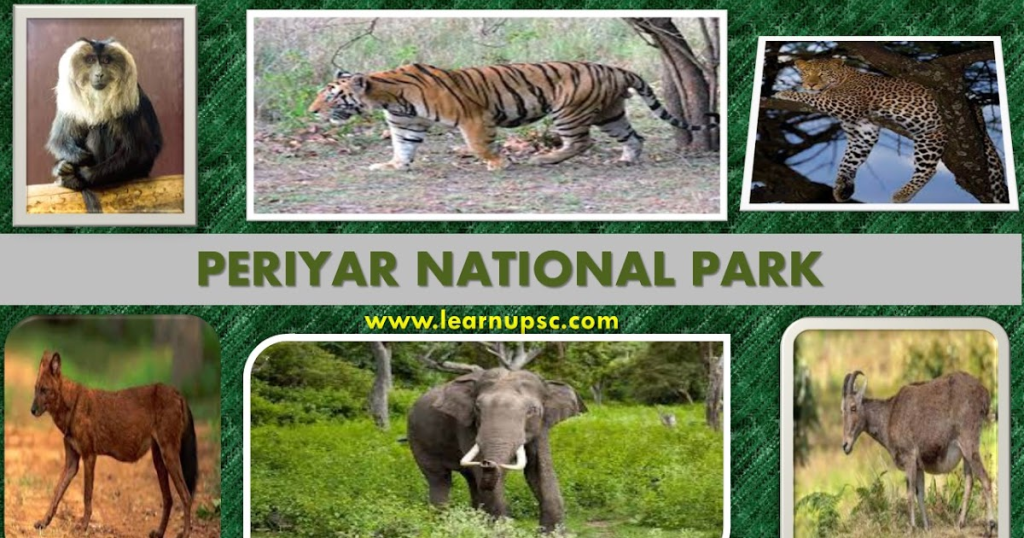
Periyar Wildlife Sanctuary is the heart of Thekkady’s appeal and a must-visit for wildlife enthusiasts. Spanning over 350 square kilometers, the sanctuary is a protected area known for its rich biodiversity. It shelters elephants, tigers, leopards, gaur (Indian bison), sambar deer, wild boars, and over 250 species of birds.
- Boat Safari: The most popular way to explore the sanctuary is via a boat cruise on Periyar Lake, a man-made reservoir. The boat safari offers unique chances to spot animals coming to the water’s edge, especially during the early morning and late afternoon. The tranquil waters framed by dense forests provide excellent photography opportunities.
- Trekking and Jungle Walks: Several guided trekking trails inside the sanctuary allow visitors to experience the forest up close. Nature walks with trained guides provide insights into the flora, fauna, and tribal culture of the region.
2. Spice Plantations

Thekkady is famed for its sprawling spice plantations, often referred to as the “Spice Capital” of Kerala. The fertile soil and humid climate create ideal conditions for growing a variety of spices such as cardamom, black pepper, cinnamon, clove, nutmeg, and vanilla.
- What to See: Tourists can stroll through verdant plantations, observe how spices are grown, harvested, and processed, and learn about their medicinal and culinary uses.
- Tours Available: Many plantations offer guided tours that include tasting sessions, hands-on experiences, and opportunities to purchase fresh spices and essential oils directly from the source.
3. Elephant Rides and Cultural Shows

- Elephant Rides: For a memorable jungle experience, visitors can take elephant rides offered near the sanctuary entrance. Riding atop these gentle giants through forest trails is both thrilling and immersive.
- Cultural Shows: Thekkady also offers rich cultural experiences. Popular shows include:
- Kathakali: A traditional Kerala dance-drama known for its elaborate costumes, makeup, and storytelling through expressions and gestures.
- Kalaripayattu: An ancient martial art form of Kerala, demonstrated through energetic and skillful performances.
- Traditional Folk Dances: Showcasing the region’s vibrant cultural heritage.
4. Nature Walks and Trekking Routes
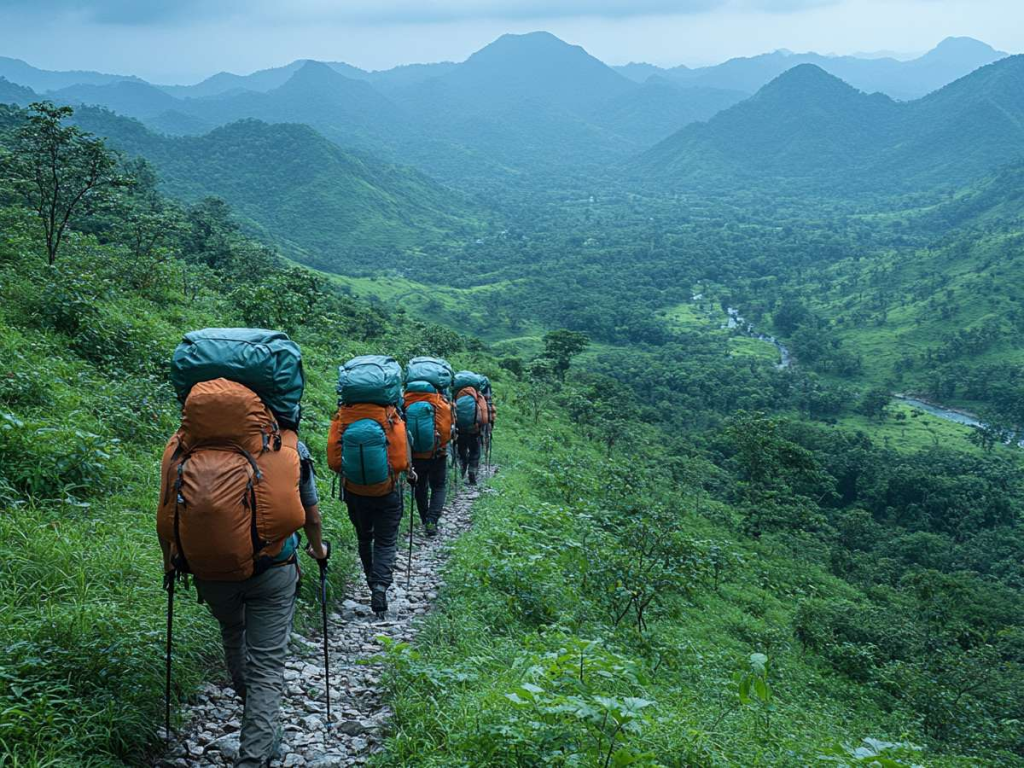
For adventure lovers and nature enthusiasts, Thekkady has several trekking routes and nature trails:
- Periyar Nature Walk: A relatively easy guided walk through the forest, perfect for bird watching and spotting smaller wildlife.
- Mangala Devi Trek: A moderate trek leading to the Mangala Devi Temple inside the sanctuary, offering stunning views and a spiritual experience.
- Chembra Peak and Other Nearby Trails: While Chembra Peak is a bit farther away, there are other lesser-known trekking options around Thekkady for those seeking solitude and adventure.
5. Nearby Attractions
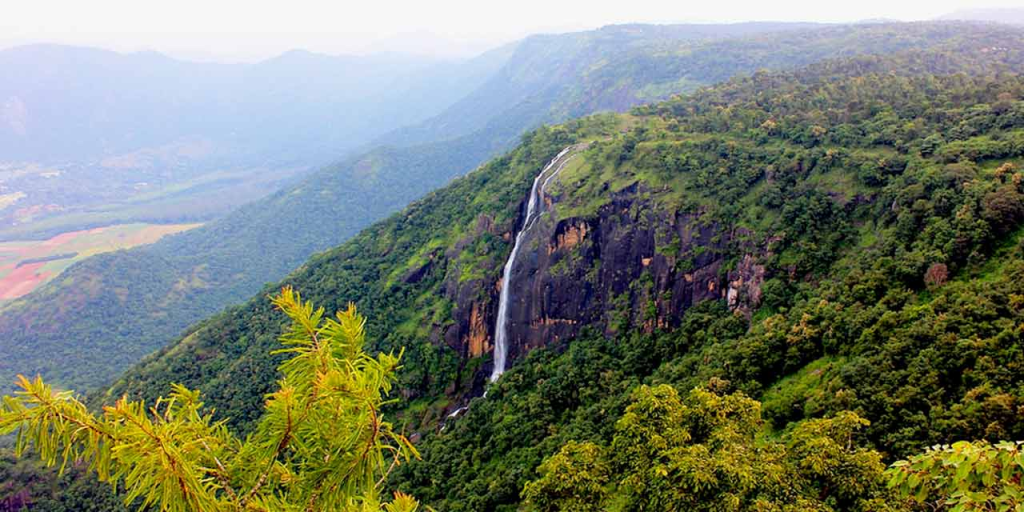
- Chellarkovil Viewpoint: Located about 20 kilometers from Thekkady, this scenic viewpoint offers breathtaking panoramas of the Western Ghats and the Tamil Nadu-Kerala border. It’s especially beautiful at sunrise and sunset.
- Mangala Devi Temple: Situated within the Periyar Wildlife Sanctuary, this ancient temple dedicated to Goddess Mangala Devi is accessible via trekking routes. The temple provides a peaceful retreat amidst nature.
- Pallivasal Waterfalls: Around 12 kilometers from Thekkady, these waterfalls offer a serene spot to relax and enjoy the natural surroundings.
Things to Do in Thekkady
1. Wildlife Safaris and Boat Cruises
- Boat Cruises on Periyar Lake: The most popular way to explore the Periyar Wildlife Sanctuary. Early morning or late afternoon cruises offer the best chances to spot elephants, deer, wild boars, and a variety of birds along the lake’s edge.
- Jungle Safaris and Nature Walks: Guided treks inside the sanctuary let you experience the forest’s rich biodiversity up close, with chances to see rare flora and fauna.
2. Trekking and Hiking Trails
Thekkady is surrounded by scenic hills and forests that offer a variety of trekking routes suitable for all levels:
- Periyar Nature Trail: A gentle walk ideal for beginners, perfect for bird watchers and nature lovers.
- Mangala Devi Trek: A moderately challenging trek to an ancient temple within the sanctuary, offering stunning views.
- Chembra Peak and Other Nearby Hikes: For the adventurous, these hikes provide panoramic views of the Western Ghats and neighboring valleys.
3. Bird Watching
With over 250 species of birds in Periyar Wildlife Sanctuary, Thekkady is a bird watcher’s paradise. Some common sightings include:
- Malabar pied hornbill
- Great Indian hornbill
- Various species of kingfishers, eagles, and woodpeckers
- Migratory birds during certain seasons
Guided bird-watching tours are available, providing binoculars and expert insights.
4. Visiting Spice Gardens and Learning About Spices
Take a guided tour of Thekkady’s famous spice plantations where you can:
- Learn about the cultivation and harvesting of spices like cardamom, pepper, cinnamon, and vanilla.
- Understand the medicinal and culinary uses of these spices.
- Purchase fresh spices, oils, and homemade products directly from the farms.
5. Adventure Activities
For thrill-seekers, Thekkady offers exciting adventure options:
- Bamboo Rafting: Glide down calm rivers on traditional bamboo rafts, enjoying the peaceful surroundings and spotting wildlife along the banks.
- Kayaking: Available in selected water bodies around Thekkady, offering a refreshing way to explore nature.
- Ziplining and Rope Courses: Some resorts and adventure centers offer these for adrenaline-pumping fun.
6. Cultural Experiences and Local Festivals
Immerse yourself in the rich culture of Kerala through:
- Kathakali Performances: Watch the iconic classical dance-drama characterized by elaborate costumes and expressive storytelling.
- Kalaripayattu Shows: Witness Kerala’s ancient martial art with impressive demonstrations.
- Local Festivals: If visiting during festivals like Onam or Vishu, experience traditional celebrations, music, and feasts.
- Village Visits: Engage with local communities, see traditional lifestyles, and try authentic Kerala cuisine in homestays.
Shopping in Thekkady
What to Buy
Thekkady is a shopper’s delight, especially for those interested in spices and traditional handicrafts. Here are the top items to look out for:
- Spices: Thekkady is famous for its fresh and aromatic spices like cardamom, black pepper, cinnamon, cloves, nutmeg, and vanilla. Buying directly from spice plantations or local shops ensures authenticity and quality.
- Handicrafts: Look for traditional Kerala handicrafts such as coir products, wooden carvings, bamboo artifacts, and woven mats.
- Essential Oils and Herbal Products: Extracted from local spices and plants, these are popular for their therapeutic and aromatic properties.
- Souvenirs: Items like brass lamps, Kathakali masks, traditional jewelry, and spices packaged attractively make great gifts and mementos.
- Tea and Coffee: Though not grown in Thekkady itself, nearby hill stations supply quality tea and coffee that you can find in local markets.
Best Markets and Shops
- Thekkady Market: The bustling local market near the main town is the best place to buy spices and fresh produce at reasonable prices. It’s also a great spot to explore local life.
- Spice Plantations Shops: Many plantations have their own stores selling freshly harvested spices and oils.
- Forest Department Shop: Near the Periyar Wildlife Sanctuary entrance, it offers eco-friendly souvenirs and handicrafts made by local artisans.
- Handicraft Shops: Scattered around town, these shops sell a variety of handmade goods and traditional Kerala crafts.
Tips for Bargaining and Shopping Etiquette
- Bargain Politely: Haggling is common in local markets but always do it respectfully and with a smile. Start by offering about 60-70% of the quoted price and negotiate from there.
- Check Quality: Especially for spices, smell and ask about freshness. Packaged items are generally more reliable.
- Cash is King: While some shops accept cards, many smaller vendors prefer cash. Carry small denominations for convenience.
- Support Local Artisans: Prefer buying directly from local producers or cooperative stores to ensure fair prices and support the community.
- Be Patient and Friendly: Taking time to chat with shopkeepers can lead to better deals and a more enjoyable shopping experience.
- Avoid Overpacking: When buying spices or oils, pack them securely to avoid spills during travel.
Travel Tips and Safety in Thekkady
Health and Safety Advice
- Vaccinations: Before traveling to Thekkady, ensure you are up to date on routine vaccinations such as tetanus, diphtheria, and hepatitis A. Consult your doctor about vaccines for typhoid and Japanese encephalitis, especially if you plan extended jungle treks.
- Jungle Precautions: Use insect repellents to protect against mosquitoes and ticks, which can carry diseases like malaria and dengue. Wear long sleeves and pants during treks, and avoid walking through dense bushes alone.
- Stay Hydrated: Drink only bottled or purified water. Avoid consuming raw or street food from untrusted sources to prevent stomach ailments.
Wildlife Encounter Safety
- Keep a Safe Distance: Never approach or feed wild animals, including elephants, monkeys, and birds. Maintain a safe distance to avoid startling them.
- Follow Guide Instructions: When on safaris or nature walks, strictly follow the instructions of trained guides and park officials.
- Avoid Noisy Behavior: Loud noises can disturb animals and increase risk. Speak softly and avoid sudden movements.
- Don’t Litter: Preserve the sanctuary’s environment by carrying back all trash and not leaving food scraps, which can harm wildlife.
Local Customs and Etiquette
- Respect Religious Sites: Dress modestly and remove footwear when visiting temples or sacred places.
- Polite Greetings: Use traditional greetings like “Namaste” or “Namaskaram” when meeting locals.
- Photography: Always ask permission before photographing people, especially in villages or tribal areas.
- Dress Code: Lightweight, modest clothing is recommended. Avoid wearing revealing attire in rural areas.
- Tipping: While not mandatory, small tips to guides, drivers, and service staff are appreciated.
Language and Communication Tips
- Languages Spoken: Malayalam is the official language in Kerala. English and Hindi are commonly understood in tourist areas.
- Basic Phrases: Learning simple Malayalam phrases like “Thank you” (Nanni), “Hello” (Namaskaram), and “How much?” (Ethra?) can enhance interactions.
- Mobile Connectivity: Most areas have good mobile coverage, and internet access is widely available in hotels and cafes.
Emergency Contacts and Useful Numbers
- Local Police: 100
- Ambulance/Emergency Medical Services: 108
- Fire Department: 101
- Periyar Wildlife Sanctuary Office: +91 4868 222 353
- Tourist Police (Kerala): +91 471 232 3500
- Nearest Hospital: Thekkady Government Hospital, +91 4868 222 677
Itinerary Suggestions for Thekkady
1-Day Itinerary
Morning:
- Start early with a boat safari on Periyar Lake to catch wildlife sightings in the cool hours.
- Visit a nearby spice plantation for a guided tour and spice tasting.
Afternoon:
- Enjoy lunch at a local restaurant serving Kerala cuisine.
- Head to the Kadathanadan Kalari Centre to watch a Kalaripayattu martial arts or Kathakali dance performance.
Evening:
- Explore the local Thekkady Market for souvenirs and spices.
- Relax with a traditional Kerala dinner at your accommodation.
2-3 Days Itinerary
Day 1:
- Boat safari and spice plantation tour as above.
- Visit Pallivasal Waterfalls for a refreshing nature walk.
Day 2:
- Morning nature trek to Mangala Devi Temple inside Periyar Reserve.
- Afternoon visit to Chellarkovil Viewpoint for panoramic views.
- Evening attend a cultural show or elephant ride.
Day 3:
- Optional adventure activities like bamboo rafting or kayaking.
- Leisure time for shopping or visiting local villages.
- Enjoy a relaxing Ayurvedic massage or spa session.
Family-Friendly Itinerary
Day 1:
- Gentle boat cruise on Periyar Lake for easy wildlife viewing.
- Visit spice gardens with interactive tours suited for children.
Day 2:
- Visit the Kadathanadan Kalari Centre for engaging cultural shows.
- Explore easy nature trails like the Periyar Nature Walk.
- Evening leisure time at your resort, possibly with kid-friendly activities.
Day 3:
- Short visit to Pallivasal Waterfalls and nearby parks.
- Optional animal interactions (like elephant rides) with safety supervision.
Adventure-Focused Itinerary
Day 1:
- Early morning wildlife safari on foot or jeep.
- Spice plantation tour with trekking in plantation areas.
Day 2:
- Full-day Mangala Devi trek, exploring dense forest and wildlife.
- Evening Kalaripayattu martial arts show for cultural immersion.
Day 3:
- Bamboo rafting on the Periyar River.
- Ziplining or kayaking sessions if available.
- Night jungle walk or guided night safari (subject to permissions).
Sustainability and Responsible Tourism in Thekkady
Eco-Friendly Travel Tips
- Minimize Plastic Use: Carry reusable water bottles and bags to reduce plastic waste. Avoid single-use plastics, which harm wildlife and pollute the forests.
- Use Public Transport or Shared Rides: Whenever possible, use buses, shared taxis, or walk to reduce carbon footprint.
- Stay at Eco-Friendly Accommodations: Choose hotels and resorts that follow sustainable practices such as rainwater harvesting, solar power, and waste recycling.
- Conserve Water and Energy: Be mindful of water and electricity consumption in your lodging and during activities.
- Carry Biodegradable Products: Use eco-friendly soaps, shampoos, and insect repellents to prevent chemical contamination of natural habitats.
How to Respect Wildlife and Nature
- Observe from a Distance: Avoid disturbing animals or their habitats. Use binoculars or cameras with zoom lenses rather than getting too close.
- Do Not Feed Wildlife: Feeding wild animals disrupts their natural behavior and diet, potentially causing harm.
- Stick to Marked Trails: Avoid wandering off trails to protect flora and prevent soil erosion.
- Do Not Litter: Carry all trash back with you and dispose of it in designated bins.
- Avoid Loud Noises: Maintain silence or speak softly during safaris and treks to avoid stressing animals.
Supporting Local Communities
- Buy Local Products: Purchase spices, handicrafts, and souvenirs directly from local artisans and cooperatives to support their livelihoods.
- Choose Homestays: Staying with local families helps foster cultural exchange and provides economic benefits to the community.
- Respect Local Culture: Learn about and honor the customs, traditions, and festivals of the indigenous and local people.
- Engage Local Guides: Hire guides from the community who are knowledgeable about the area and wildlife, ensuring authentic experiences and fair employment.
- Participate in Community Projects: Some eco-tourism initiatives offer opportunities to volunteer or contribute to conservation and social projects.
Frequently Asked Questions (FAQs) About Thekkady
1. What is the best time to visit Thekkady?
The ideal time is between October and February when the weather is cool and pleasant, perfect for wildlife safaris and outdoor activities. The monsoon season (June to September) offers lush greenery but heavy rains can disrupt travel.
2. How do I reach Thekkady?
Thekkady is accessible by air via Cochin International Airport (140 km) or Madurai Airport (114 km). The nearest railway stations are Kottayam and Madurai. Road connectivity is good, with regular bus and taxi services from nearby cities.
3. Is Thekkady safe for solo travelers and families?
Yes, Thekkady is generally safe. However, solo travelers should avoid trekking alone and always inform someone about their plans. Families will find many child-friendly activities and safe accommodations.
4. What wildlife can I expect to see in Periyar Wildlife Sanctuary?
You can spot elephants, deer, sambar, wild boars, and various bird species. Tiger sightings are rare but possible. The boat safari offers some of the best wildlife viewing opportunities.
5. Are there vegetarian food options available?
Absolutely. Kerala cuisine offers a rich variety of vegetarian dishes, and most restaurants in Thekkady cater to vegetarian and vegan diets.
6. Do I need a permit to enter Periyar Wildlife Sanctuary?
Yes, visitors require an entry permit to access the sanctuary and participate in safaris. Permits can be booked online or at the sanctuary entrance.
7. What should I pack for a trip to Thekkady?
Pack comfortable clothing, trekking shoes, rain gear (if visiting during monsoon), insect repellent, sunscreen, binoculars, and a camera. Light woolens are recommended for winter mornings and evenings.
8. Can I use mobile networks and internet in Thekkady?
Most major mobile networks work well in Thekkady. Internet is available in hotels and cafes, though forest areas may have limited connectivity.
9. Are there any cultural customs I should be aware of?
Dress modestly, especially when visiting temples. Always seek permission before photographing people. Respect local traditions and avoid loud behavior in rural and wildlife areas.
10. Is it possible to see cultural performances in Thekkady?
Yes, several venues and resorts organize Kathakali dance shows, Kalaripayattu martial arts demonstrations, and other traditional performances.
I am a passionate traveler, city explorer, and digital publisher focused on documenting real journeys, local cultures, and everyday travel experiences across India and beyond. Through my platforms, I share practical travel guides, city blogs, and daily travel logs that help readers explore destinations with confidence and local insight.
I am the creator of HolidayLandmark, a travel-focused ecosystem covering destinations, stories, and experiences through blogs, social platforms, and curated travel content:
- Instagram – HolidayLandmark
- Facebook – HolidayLandmark
- YouTube – HolidayLandmark
- LinkedIn – HolidayLandmark
- X (Twitter) – HolidayLandmark
- HolidayLandmark on Blogger
- HolidayLandmark on WordPress
- HolidayLandmark Stories
Alongside HolidayLandmark, I manage multiple city-focused travel portals where I publish daily travel logs and in-depth city blogs covering local attractions, food, culture, and real traveler experiences:
City Daily Travel Logs
- Bangalore Orbit – Daily Logs
- Bhopal Orbit – Daily Logs
- Chennai Orbit – Daily Logs
- Gujarat Orbit – Daily Logs
- Kerala Orbit – Daily Logs
- Mera Apna Bihar – Daily Logs
- Mumbai Orbit – Daily Logs
City Blogs & Travel Guides
- Bangalore Orbit – Blog
- Bhopal Orbit – Blog
- Chennai Orbit – Blog
- Gujarat Orbit – Blog
- Kerala Orbit – Blog
- Mera Apna Bihar – Blog
- Mumbai Orbit – Blog
Through these platforms, my goal is to create a connected travel network that offers reliable city information, real-time travel experiences, and practical guidance for travelers, explorers, and local enthusiasts.